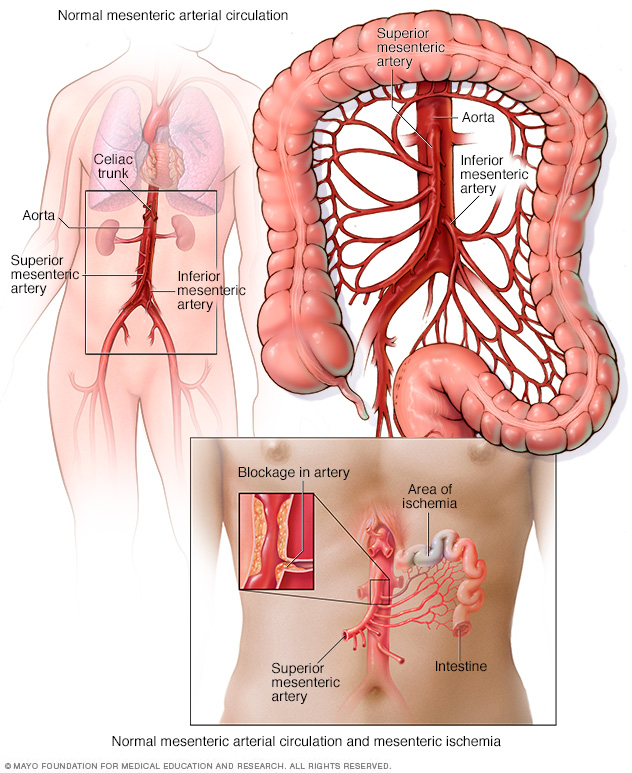Overview
Mesenteric ischemia (mez-un-TER-ik is-KEE-me-uh) is a condition that happens when narrowed or blocked arteries restrict blood flow to your small intestine. Decreased blood flow can permanently damage the small intestine.
Sudden loss of blood flow to the small intestine is called acute mesenteric ischemia. The acute type is often caused by a blood clot and requires an immediate treatment, such as surgery.
Mesenteric ischemia that develops over time is called chronic mesenteric ischemia. The chronic type is usually caused by a buildup of fatty deposits in the arteries. Chronic mesenteric ischemia is treated with open surgery or a procedure called angioplasty.
Chronic mesenteric ischemia can become acute if it's not treated. It also can lead to severe weight loss and malnutrition.

Symptoms
Acute mesenteric ischemia
Symptoms of the acute form of mesenteric ischemia include:
- Sudden, severe belly pain.
- Urgent need to have a bowel movement.
- Fever.
- Nausea and vomiting.
Chronic mesenteric ischemia
Symptoms of the chronic form of mesenteric ischemia include:
- Belly pain that starts about 30 minutes after eating.
- Pain that worsens over an hour.
- Pain that goes away within 1 to 3 hours.
When to see a doctor
If you have severe, sudden belly pain that persists, seek emergency medical care. If you develop pain after eating, make an appointment with your primary care provider.
Causes
Both acute and chronic mesenteric ischemia are caused by a decrease in blood flow to the small intestine. Acute mesenteric ischemia is most commonly caused by a blood clot in the main mesenteric artery. The blood clot often starts in the heart. The chronic form is most commonly caused by a buildup of fatty deposits, called plaque, that narrows the arteries.
Risk factors
The most common risk factors for acute mesenteric ischemia include:
- Atrial fibrillation — an irregular and often very rapid heart rhythm.
- Congestive heart failure — a condition in which the heart muscle doesn't pump blood as well as it should.
- Recent vascular surgery.
The most common risk factors for chronic mesenteric ischemia include:
- Type 2 diabetes.
- High cholesterol levels.
- High blood pressure.
- Artery disease.
- Smoking.
- Obesity.
- Older age.
Complications
If not treated promptly, acute mesenteric ischemia can lead to:
- Irreversible bowel damage. Not getting enough blood flow to the bowel can cause parts of the bowel to die.
- Sepsis. This potentially life-threatening condition is caused by the body releasing chemicals into the bloodstream to fight infection. In sepsis, the body overreacts to the chemicals, triggering changes that can lead to multiple organ failure.
- Death. Both of the above complications may lead to death.
People with chronic mesenteric ischemia can develop:
- Fear of eating. This happens because of the after-meal pain associated with the condition.
- Weight loss that isn't intended. This can occur as a result of the fear of eating.
- Acute-on-chronic mesenteric ischemia. Symptoms of chronic mesenteric ischemia can get worse, leading to the acute form of the condition.
Diagnosis
If you have pain after eating that causes you to limit food and lose weight, your health care provider might suspect that you have chronic mesenteric ischemia. A narrowing of the major arteries to the small intestine can help confirm the diagnosis.
Tests might include:
- Angiography. Your health care provider might recommend a CT scan, MRI or X-ray of your abdomen to find out if the arteries to your small intestine have narrowed. Adding a contrast dye can help pinpoint areas where the arteries have narrowed.
- Doppler ultrasound. This noninvasive test uses sound waves to check blood flow, which can determine narrowing of the arteries.
Treatment
If a blood clot causes a sudden loss of blood flow to the small intestine, you might require immediate surgery to treat your mesenteric ischemia.
Mesenteric ischemia that develops over time might be treated with angioplasty. Angioplasty is a procedure that uses a balloon to open the narrowed area. A mesh tube called a stent might be placed in the narrowed area.
Mesenteric ischemia also can be treated via open surgery through an incision.
© 1998-2025 Mayo Foundation for Medical Education and Research (MFMER). All rights reserved. Terms of Use


